In May 2021, as Putin began to implement his strategy of strangling Europe with gas deprivation, the Belarusian dictator launched another time bomb. On May 26 he announced that Minsk would no longer detain illegal immigrants trying to reach the territory of the European Union via Belarus: “We were stopping drugs and migrants — now it’s up to you to eat them and catch them yourself.” On June 2, he stated: “I said honestly that we will no longer keep those people whose lives you have turned to hell in Afghanistan, Iran, Iraq. We don’t have the money or the energy for that because of your sanctions.”
By Françoise Thom — Desk Russia — 25 November 2021 —[1]
In July 2021, speaking on the Telegram channel BelTA, he added: “We will never keep anyone: they do not come to us. They are leaving for enlightened Europe, a warm and cozy Europe. Europe lacks workers and brings these people here”. Lukashenko has been convinced by the example of Erdogan that blackmailing Europe using migrants pays off (twice, in 2015 and March 2020, he opened Turkey’s borders, causing a serious crisis in the EU).
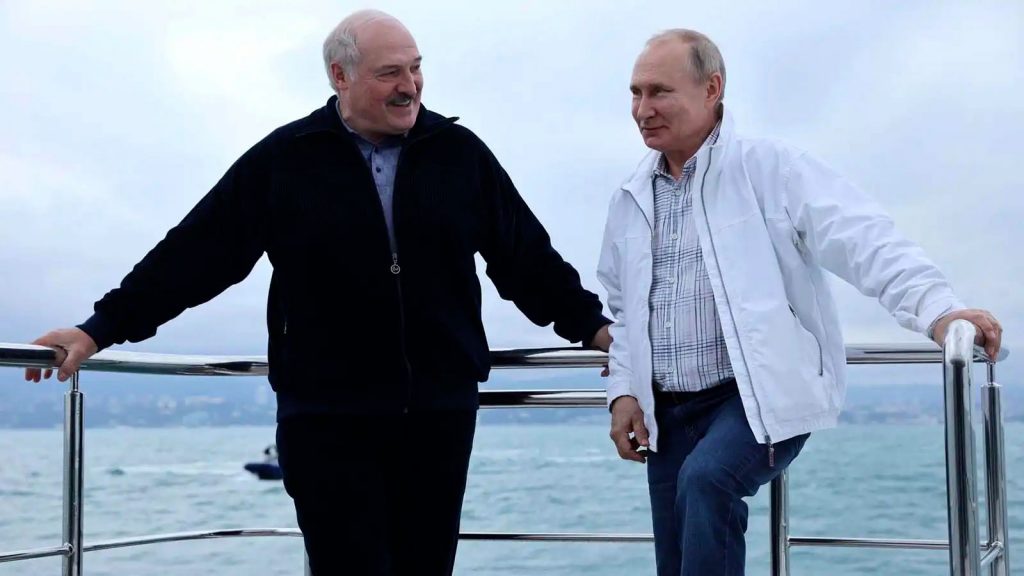
As a result, Lithuania and then Poland had to take emergency measures to try to stem the flow of illegal migrants. The European Union accuses the Lukashenko regime of deliberately provoking this migration crisis and organizing the transfer of thousands of illegal immigrants to the EU’s borders in response to the sanctions Europe has imposed on his regime. There is no doubt that the crisis was organized by the Belarusian president.
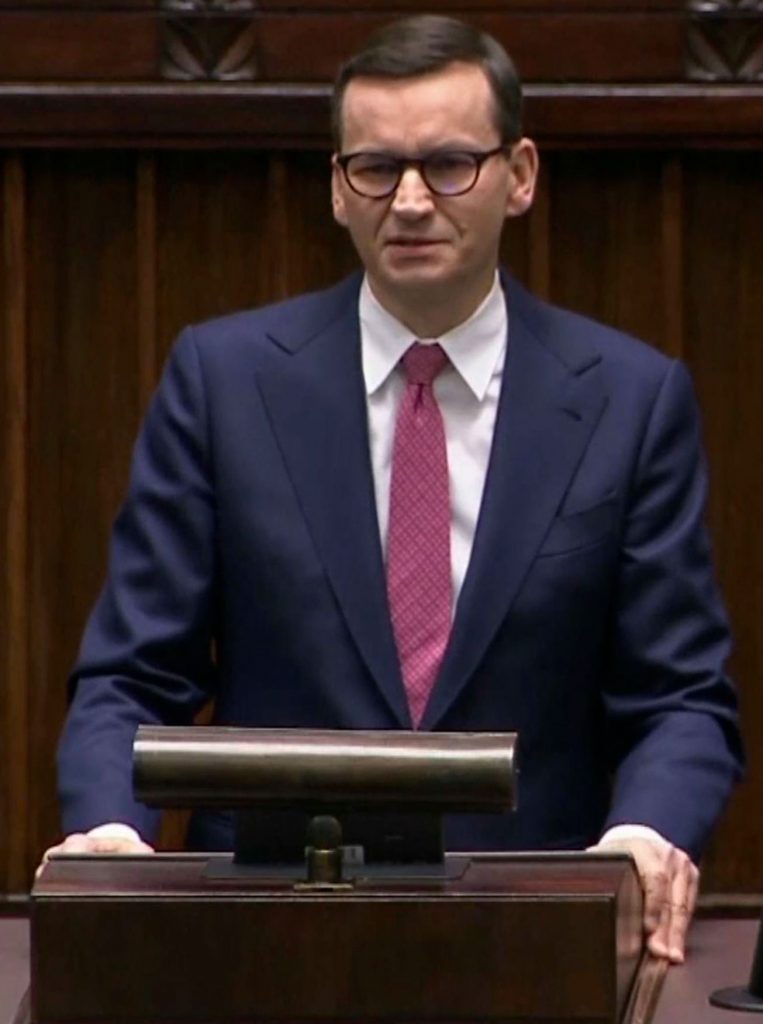
According to Polish Prime Minister Mateusz Morawiecki, “We all know that one man, Alexander Lukashenko, has deliberately brought tens of thousands of people to Belarus, that Alexander Lukashenko is moving to our eastern border these human groups, sometimes by violence, we have this information from Minsk. It is Alexander Lukashenko who uses these people as human shields.”
Until about mid-October, citizens of some Middle Eastern countries could obtain a Belarusian visa directly at the airport in Minsk . Regular flights from Baghdad to Minsk leave 5 times a week. Middle Eastern migrants travel mainly on student and tourist visas.
Mateusz Morawiecki at the Sejm – E-S Photo
According to Polish Prime Minister Mateusz Morawiecki, “We all know that one man, Alexander Lukashenko, has deliberately brought tens of thousands of people to Belarus, that Alexander Lukashenko is moving to our eastern border these human groups, sometimes by violence, we have this information from Minsk. It is Alexander Lukashenko who uses these people as human shields.” Until about mid-October, citizens of some Middle Eastern countries could obtain a Belarusian visa directly at the airport in Minsk . Regular flights from Baghdad to Minsk leave 5 times a week. Middle Eastern migrants travel mainly on student and tourist visas.
It was necessary to organize flights to Minsk from other cities in Iraq: a weekly flight from Sulaimaniyah, from August 5, flights from Basra, and from August 7 from Erbil. Since all tickets to the capital of Belarus are instantly sold out, charter flights have been organized from Iraq to Minsk. There are 8 regular flights per week from Turkey. The Belarusian army transports the migrants to Lithuania or to the Polish border.
The President of the European Commission, Ursula von der Leyen, called on the member states on November 8 to approve new sanctions against the Belarusian authorities: “The use of migrants for political purposes is unacceptable,” she said.
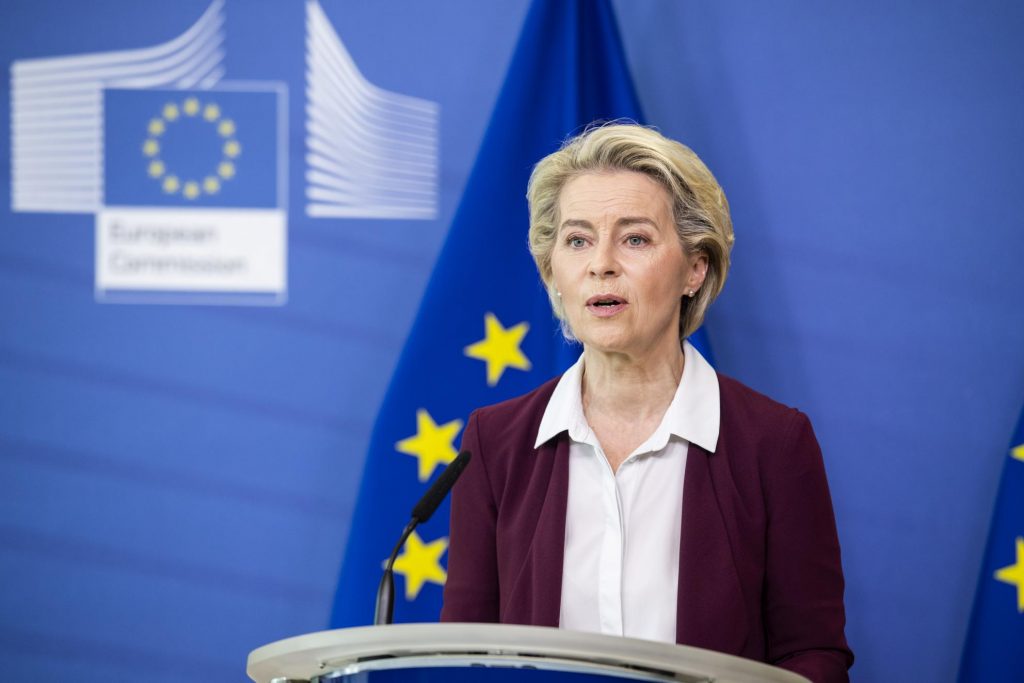
In addition to extending the sanctions against Minsk, she announced that the EU “will examine how to sanction third country airlines” that transport migrants to Belarus. Von der Leyen reacted after several hundred migrants, mostly Kurds, tried to break through a barbed wire fence near the “Kuźnica” crossing point on the Belarusian-Polish border. Aerial video footage posted online showed them being forced to do so by armed Belarusian officers, some with attack dogs, some of whom reportedly fired shots into the air behind the crowd, where children were present. Polish guards repelled the would-be asylum seekers with water cannon and tear gas.
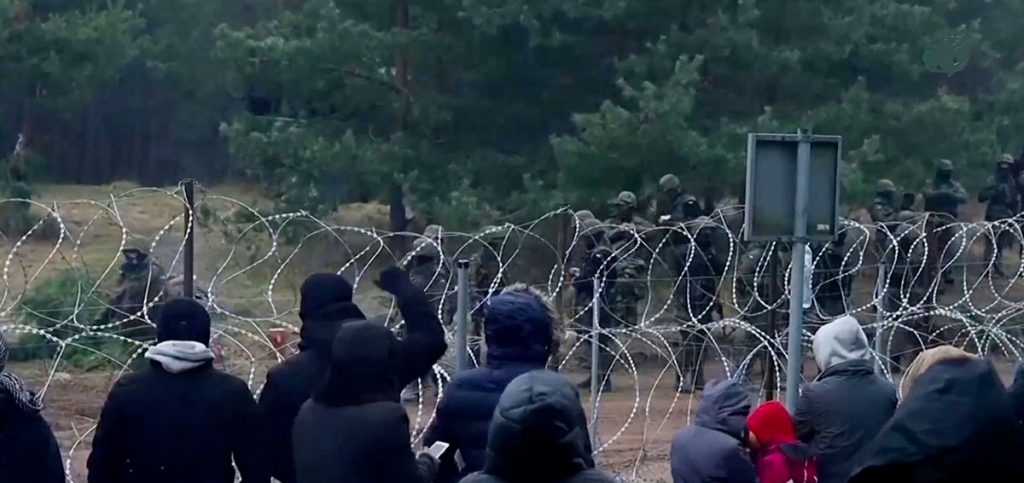
On November 10, Poland sent 13,000 more border guards, in addition to 12,000 soldiers and riot police. This is a real army of 25,000 men. Serious incidents have occurred, including Belarusian military personnel challenging Polish border guards and regular drone intrusions into Polish territory over the past several months.
Kolejne próby forsowania granicy przez migrantów w rejonie Kuźnicy. pic.twitter.com/0Qv2K1RVcz
— Ministerstwo Obrony Narodowej 🇵🇱 (@MON_GOV_PL) November 8, 2021
The elephant in the room in this whole affair, which Europe has long tried not to see, is Russia’s role in what is not a migration crisis but a hybrid war against Europe.[2] The alarm has first been sounded in Eastern Europe. Lithuanian Foreign Minister Gabrielius Landsbergis, has called for a common European response — also towards Moscow; Horst Zeehöfer, the German Interior Minister, said in an interview on November 9: “We have to help the Polish government to secure the external border. This should be the responsibility of the European Commission. I now call for action. All EU states must unite here because Lukashenko, with the support of Russian President Vladimir Putin, is using the fate of the people to destabilize the West. So now we have to stand together. Poland or Germany can’t do it alone. The Poles have reacted correctly so far. I also say that we need to build secure borders. We must publicly support the Poles! We cannot blame them for protecting the EU’s external border with authorized means. […] We call what is happening now a hybrid threat, where people are instrumentalized to destabilize the EU and especially Germany — the world must not tolerate this! […] The Poles are doing a very important service for the whole of Europe — just as Turkey, by taking in more than three million refugees, has also pursued a refugee policy for the benefit of Europe. So there is a difference between Putin and Erdogan.”
According to Polish Foreign Ministry spokesman Lukasz Yasina, “nothing happens in Belarus without Russia’s complicity.” Lukashenko’s Belarus is “an ally that regularly supports the Russian agenda in all international organizations, stigmatizes the ‘hated West’ and obediently offers its territory for everything that is asked of it — from military maneuvers to the capture of Ukrainian militants. Much better, compared to Lukashenko, Putin no longer looks like an absolute evil in the eyes of Europe and the United States, but a rather sane national leader with whom one can at least talk.”
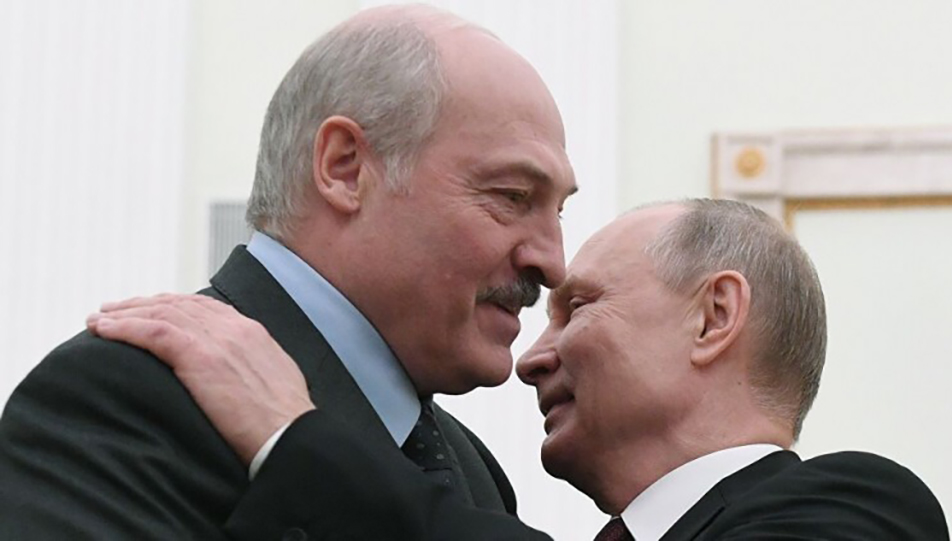
We must keep in mind that at a meeting of the [Russian-Belarusian] Supreme Council of the Union State on November 4, Russian and Belarusian leaders adopted the main provisions of the treaty on the creation of the State of the Union for 2021-2023, including a concept of migration policy and a common military doctrine. Lukashenko then announced that he and the Russian president were now jointly responsible for all Russian-Belarusian policy. The foreign ministers of Russia and Belarus, Sergei Lavrov and Vladimir Makei, have just adopted a new program of coordinated actions in foreign policy, which extends the one put in place two years ago, even though the treaty on the creation of the Union State specifies that foreign policy remains the responsibility of each of the two states. To make things clear, on November 10 Putin sent two Tu-160 nuclear bombers for maneuvers in Belarusian airspace. The Russian Foreign Ministry openly supports Lukashenko. Lavrov declared on November 9 that the European Union must be held responsible for its actions in the migration crisis situation on the Belarusian border with Poland and Lithuania, and that Brussels could help Minsk in the same way it helped Turkey deal with refugee flows: “When the refugees came from Turkey, the EU allocated funds to keep them on the territory of the Turkish Republic. Why is it impossible to help the Belarusians as well?” In other words, the Kremlin supports the racketeering policy inaugurated by Lukashenko. “More than 2,000 Polish soldiers invaded [Iraq] […] to establish democracy. Why not accept as many grateful Iraqis today?” Russian Foreign Ministry spokeswoman Maria Zakharova echoed, referring to Poland’s role in the 2003 U.S.-led invasion of Iraq.
This brings us to the objectives pursued by the Kremlin through this “special operation”. First of all, the aim is to isolate Belarus completely by forcing the neighbouring states to bring down an “iron curtain”, cutting it off from Europe for good and making it possible for Russia to annex it in due form (perhaps with a view to the 2024 elections?). It is also to stir up the political confrontation within Poland, the antagonism between Poland and the EU, and why not to launch the flick of the wrist that will make Poland swing towards the Polexit.
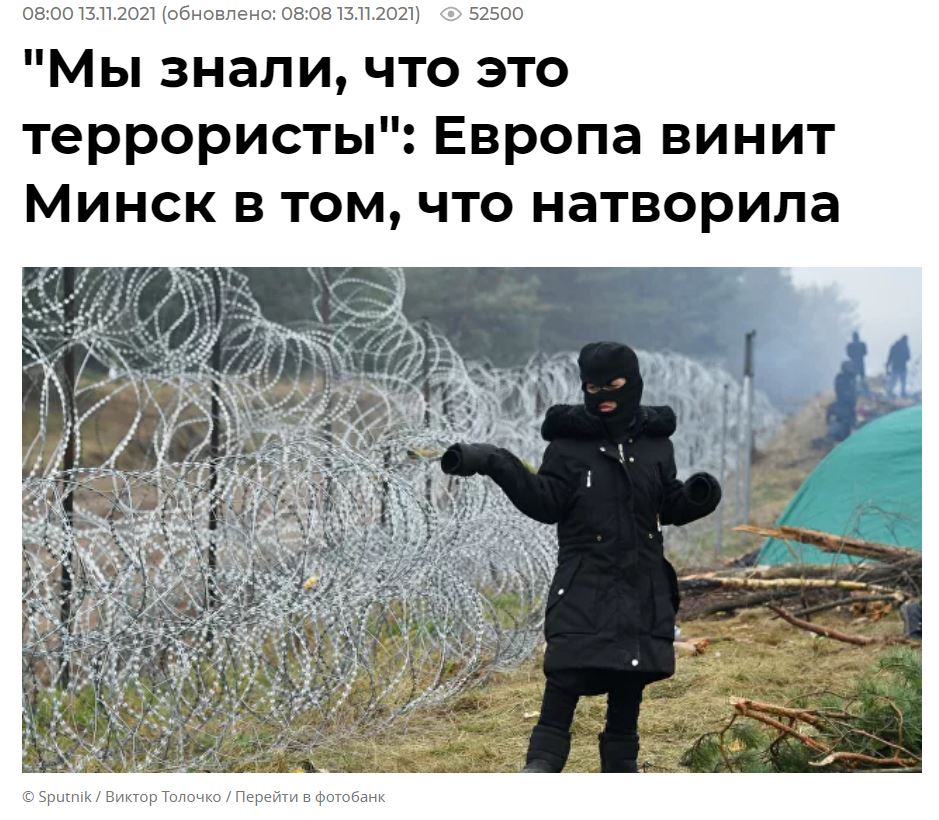
Throughout the crisis, the Russian media have been raging against Warsaw. RIA Novosti, for example, headlines: “‘Heartless and brainless’: Lukashenko showed the world the dark side of Poland”. Aggravating the gas blackmail against Europe may also have been a consideration: Lukashenko threatened to cut off the Yamal-Europe gas pipeline, and he restricted the pumping of oil through the Druzhba pipeline to Poland. In addition, the idea was to punish Germany, which voted wrongly by not putting the Kremlin’s favorite candidate, Armin Laschet, in charge. For as early as 2016, the future Chancellor Scholz had made this ominous remark for Moscow: “I do not consider it conceivable that Russia has good special relations with Germany and at the same time difficult relations with the entire European Union.” His coalition partners are highly critical of Moscow. Green Party leader Annalena Baerbock categorically rejects Putin’s Nord Stream 2 gas pipeline. And FDP [Liberal Democratic Party] leader Christian Lindner told BILD: “The pressure of sanctions on Belarus and the airlines must be increased in order to stop the smugglers and political blackmail.”
But Putin’s calculation goes further, and here we find his unerring flair for malfeasance. The statements of Russian officials – and those of Lukashenko — that we have quoted show how resentment against Europe remains a determining motivation in Russian foreign policy. The “migrant” operation seemed to be a win-win situation in the view of the Kremlin leaders.
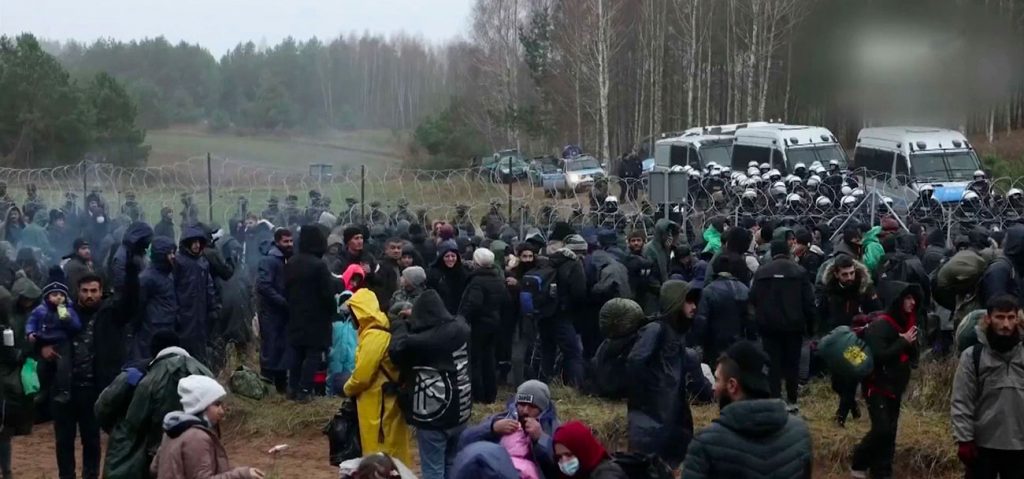
Either the Europeans would give in and open the door to a new wave of migrants. Lately the Kremlin’s strategists have had the unpleasant surprise to find that populist parties were losing ground, especially after the misfortunes of the Brexit. The last elections in Germany were notably disappointing for Moscow. It was hoped that a well-publicized flood of migrants into Europe would revive the stalled engine of the extreme parties, especially if it was accompanied by some spectacular Islamist attacks. According to Svpressa: “As the number of refugees increases, xenophobic feelings in Europe will rise. This will strengthen the far-right political parties. If they come to power, the borders will still be closed (but not completely and not forever). But above all, the far right… can destroy the European Union by repeating the Brexit in France and Germany. Britain walked away from the EU in large part because of the refugee crisis — the British were afraid of the influx of millions of Syrians, Iraqis and Afghans from the continent.”
Either Europe stood firm, showed solidarity with Poland. In this case, Russian propaganda could trumpet the alleged inhumanity of the West, fanning European guilt, by showing that morality has changed sides, since Russians now feel sorry for “women and children” forced to freeze in tents. Dmitry Peskov, President Putin’s spokesman, called the situation of migrants on the Belarusian-Polish border an “imminent humanitarian disaster”: “We are talking about the lives and health of thousands of people who are refugees and do not want to stay in Poland, but want to enter the EU,” he said, adding that in the past “these people have had access to the EU”.
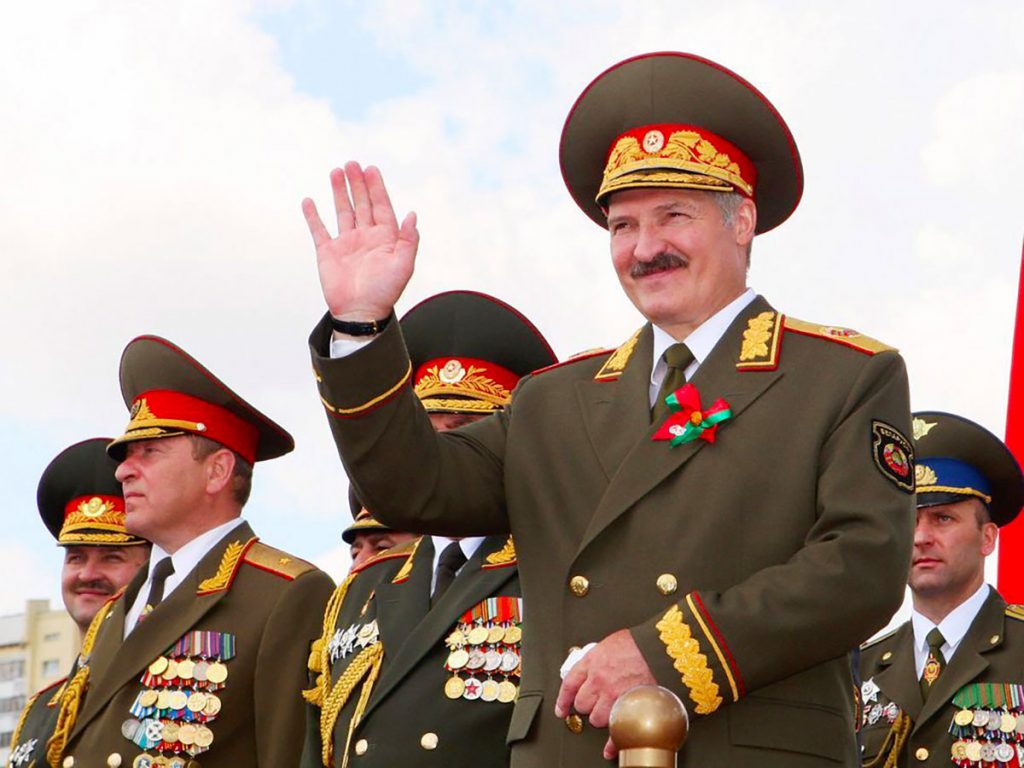
Similar themes are developed over and over again in the Russian media.
For example, the “communo-patriotic” newspaper Zavtra reports for example: “Lukashenko has thrown thousands of migrants against Poland and NATO through a hole in the fence, carefully left by the border guards. Syrians and Iraqis, among whom may well be men of Daech, trample forests and fields with the resolute step of foot soldiers. Poland and Lithuania are drawing military forces to the border to… what? Will they shoot them? They will, of course, but it won’t look very tolerant… It’s clear that migrants are becoming living weapons in the hybrid wars of the 21st century — both for destabilization of the country from within and for invasion from without.” Svpressa echoes the same line: “The rich states of the West are very vulnerable to this instrument that undermines their economic and political system and poses a serious moral and political challenge: You talk about human rights problems in Belarus or Turkey, threaten our states with sanctions, you pretend to be humanists and defenders of human rights, but you use the army instead of accepting refugees who are fleeing poverty and violence.”
As we can see, the Kremlin hoped to stir up dissension between European states and within European countries themselves, to show once again that European solidarity is just an empty word, that Western humanitarianism is hypocrisy or foolishness.
While waiting for the EU to collapse under these converging blows (gas shortages, border crisis), Moscow expects to reap some benefits by playing its usual role as an arbiter in the conflict, as it does during the Minsk negotiations when it pretends to play the role of an impartial broker between the Europeans and its separatist puppets in Ukraine.
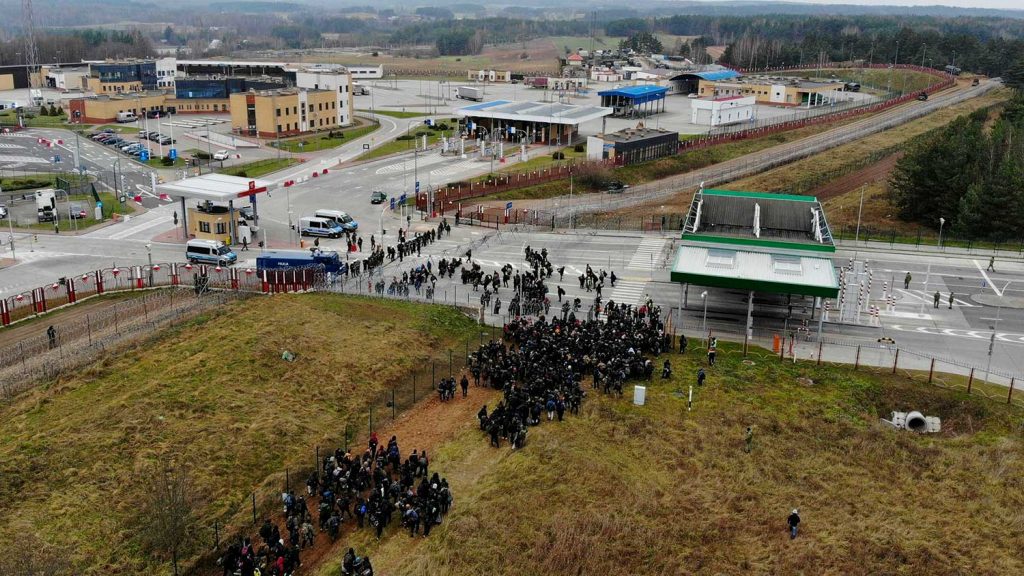
Angela Merkel once again fell into the trap of asking Vladimir Putin to influence Minsk to find a solution to the situation of migrants on the Belarusian-Polish border, only to be told, predictably, that it was necessary to negotiate with Lukashenko. This kind of move only confirms the Kremlin’s belief that the West is cowardly and that Moscow can engage in escalating provocations with impunity. European leaders should reread Machiavelli: “Between an armed man and an unarmed man there is no relation at all, and it is not logical that the armed should willingly obey the unarmed […] For if the one despises and the other suspects, it is not possible for there to be good agreement between them” (The Prince, XIV).
Nevertheless it seems that as for now, the Kremlin is not getting the expected results either by the gas blackmail or by the migrant blackmail. Europe and the United States are closing ranks and not giving in. After his success with Biden in Geneva in June 2021 and the recent withdrawal of American troops from Afghanistan, Putin hoped that Washington would hand over Ukrainian policy to the Europeans and establish a semblance of partnership with the Kremlin on disarmament, climate change and the Afghan problem. However, after an initial wavering, a different policy prevailed in Washington. The Americans increased the volume of arms deliveries to Ukraine. Secretary of Defense Lloyd Austin visited Kiev. On November 10, U.S. Secretary of State Antony Blinken and Ukrainian Foreign Minister Dmytro Kuleba signed a U.S.-Ukraine Charter on Strategic Partnership. Also noteworthy is the contract signed by Ukraine to build destroyers in the UK for the Ukrainian Navy and NATO naval exercises off the Crimean coast. The British have declared themselves ready to send a special force of 600 men in case of Russian aggression against Ukraine. Finally, on November 19, two members of the U.S. Congress submitted a bipartisan resolution to the House of Representatives proposing not to recognize the presidential elections in Russia in 2024 if Putin was a candidate.
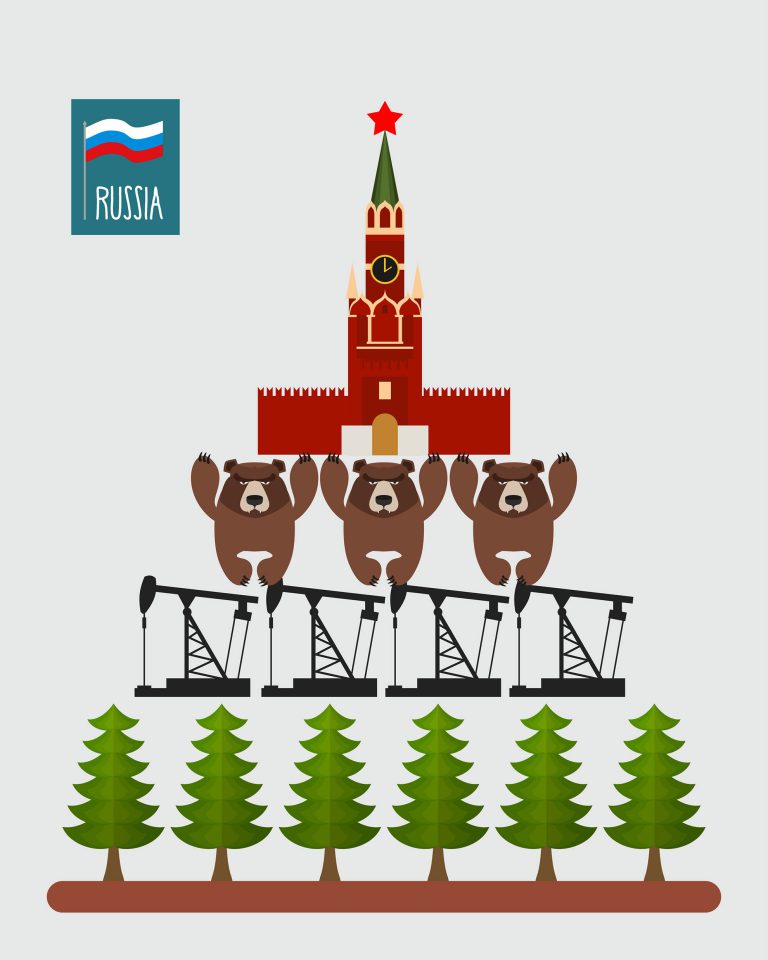
The Kremlin hoped that fears of a gas shortage this winter would force Germany to speed up the certification of Nordstream 2.
Contrary to Moscow’s expectations, Germany has suspended this procedure. The German regulator demanded the creation of a company operating the pipeline in accordance with the legislation of the Federal Republic of Germany.
Even worse for the Kremlin, Putin was counting on France and Germany to force Ukraine to comply with the Minsk agreements in their Russian interpretation, amounting to a planned disintegration of the Ukrainian state compelled to integrate the separatist enclaves teleguided by the Russian services.
The Kremlin hoped that fears of a gas shortage this winter would force Germany to speed up the certification of Nordstream 2. Contrary to Moscow’s expectations, Germany has suspended this procedure. The German regulator demanded the creation of a company operating the pipeline in accordance with the legislation of the Federal Republic of Germany. Even worse for the Kremlin, Putin was counting on France and Germany to force Ukraine to comply with the Minsk agreements in their Russian interpretation, amounting to a planned disintegration of the Ukrainian state compelled to integrate the separatist enclaves teleguided by the Russian services.
In anticipation of the November 11 meeting between Germany, France and Russia, Russia sent a draft joint statement, which had to be accepted by the Western partners for the meeting to take place. Predictably, this document demanded the establishment of a direct dialogue between Kiev and the republics of Donetsk and Lugansk, the cancellation of the language legislation adopted by Ukraine, and the revision of the Ukrainian state constitution in the direction of decentralization.
Much to Moscow’s astonishment, the French Foreign Minister Jean-Yves Le Drian and his German counterpart Heiko Maas replied on November 4, stating bluntly that Moscow’s plan contained assessments that Germany and France did not share, in particular the reference to an “internal Ukrainian conflict” and to a “direct dialogue between Kiev and the Donetsk and Lugansk republics”. The meeting did not take place. Worse still, on November 15 France and Germany issued a joint statement, warning Russia that any aggression against Ukraine would have serious consequences. On November 16 Lavrov made the exchange of correspondence public, because, as he complained, he had been “pushed to the limit” by his French and German interlocutors.
On the morning of November 15, Putin issued Decree No. 657 “On the provision of humanitarian aid to the population of ORDLO [the separatist entities]”. This decree launches the process of integrating the enterprises of the self-proclaimed republics of Donetsk and Lugansk into the Russian economy. It also provides for the merger of the two republics (since October 1 of this year, customs control of goods between the DPR and the LPR has been abolished). This is a clear indication of the Kremlin’s intention to integrate these regions economically into the Russian Federation as a preliminary step to outright annexation.
This represents a turning point in Moscow’s policy on the Ukrainian question, similar to the one Stalin made in 1949 when he reluctantly accepted to create the GDR: until then, he had hoped to take over the whole of Germany by integrating into the disarmed western Länder the Soviet occupation zone, which already had an army and a police force supervised by the Soviet services and a range of political parties, all of which were controlled by Moscow. When Adenauer decided to temporarily abandon German unity and integrate the FRG into the Western bloc, Stalin fell back on the GDR. The West having foiled the trap of the Minsk agreements, Putin is proceeding like Stalin, resigning himself to reinforce Moscow’s hold on the separatist enclaves, having failed to use them to destroy Ukrainian independence. The consolation prize does not hide the extent of the fiasco of a stratagem patiently woven since 2015.
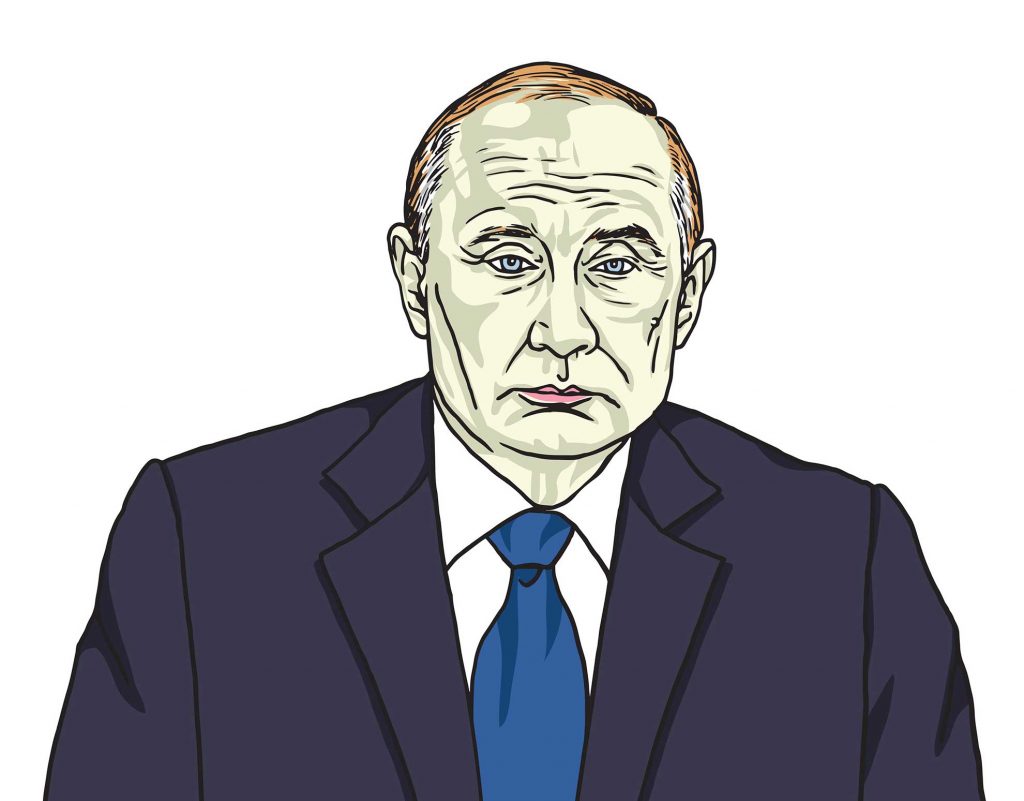
Thus for several weeks Russia has been collecting setbacks. Putin has let himself be carried away by the “vertigo of success” and the biased information coming from the kremlinophile Western networks, inclined to “wishful thinking”, which seem to strongly influence the perception of Russian decision-makers. By dint of denouncing the “mainstream” media, the Russian leaders are locking themselves in an information bubble and are increasingly dependent on the production of sovereignist and Russophile agencies that are content to spin their slogans over and over again without taking into account the in-depth developments at work in Western societies. Reading the Russian press, one almost has the impression that Zemmour is already elected, just as a few months ago the Russian media considered that the replacement of Merkel by the very complacent Laschet was in the bag. Putin is multiplying his miscalculations, to the point that it will soon be very difficult for the Western Russophile lobby to come forward openly. Thus, the manipulation of the migratory threat should make the many admirers of Putin in France who look to Russia for inspiration and a model and who continue to fantasize about Russia as the “rampart of European civilization” think twice.
We can only hope that this Western recovery will be sustainable. The moment of Putin’s succession is approaching. One can only wish that the heirs of the current president, in taking stock of the situation, will realize the appalling mess caused by Putin’s delusional foreign policy. As internal criticism becomes impossible, Russia’s landing in reality will only be possible thanks to the firmness and lucidity of its Western interlocutors.
Françoise Thom
[1] See also: « Bélarus, Ukraine : attaques hybrides contre l’Europe » by Françoise Thom – DeskRussie (2021-11-25)
[2] See also : « Ukraine, the frontline of Russia’s hybrid wars » by Jean-Sylvestre Mongrenier – DeskRussia (2021-11-26) : « What is a hybrid war » ? A “hybrid war” refers to an “undercover war”which uses proxy forces and troops whose affiliation is not clearly marked. This type of conflict combines traditional fighting in the field, destabilization operations and intimidation tactics (for example, the stationing of forces at the borders and threats of a massive intervention).What’s more, this phantom war often relies on cyber-attacks and other propaganda activities in the digital world. This is what Russian strategists call the “information war”. These are in fact propaganda and disinformation campaigns, the effectiveness of which is multiplied by new communication technologies.»
Françoise Thom’s publications on DeskRussia (2021)
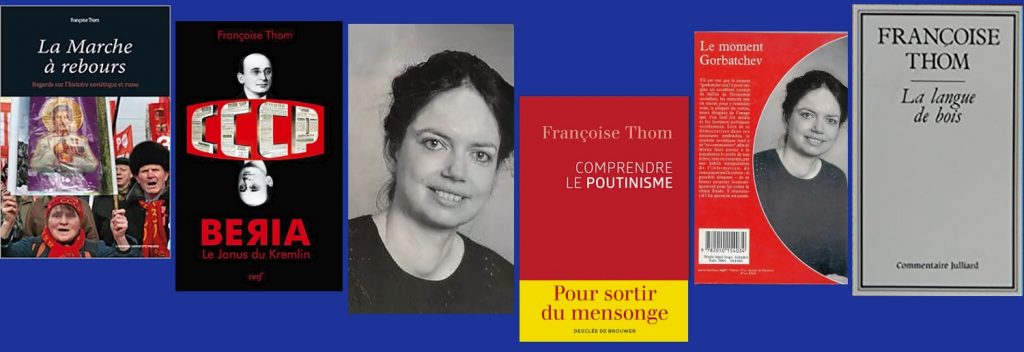
Que signifie l’ultimatum russe aux occidentaux ? in DeskRussie (2021-12-30)
What Does the Russian Ultimatum to the West Mean? in DeskRussia (2021-12-30)
Les occidentaux au pied du mur : comment faire face à un maître chanteur in DeskRussie (2021-12-14)
The West under the Gun: how to Deal with a Blackmailer in DeskRussia (2021-12-15)
Le boomerang de l’obscurantisme : le cas du Covid in DeskRussie (2021-12-10)
The Boomerang of Obscurantism: the Case of Covid in DeskRussia (2021-12-10)
Bélarus, Ukraine : attaques hybrides contre l’Europe in DeskRussie (2021-11-13)
The Migration Crisis: the Other Side of the Hybrid war Against Europe in DeskRussia (2021-11-13)
Le retour de l’utopie au pouvoir : le tournant du régime poutinien in DeskRussie (2021-11-12)
The Return of Utopia to Power: The Turning Point of Putin’s Regime in DeskRussia (2021-11-12)
La destruction des âmes par la propagande dans la Russie poutinienne in DeskRussie (2021-10-22)
The Destruction of the Soul in Putin’s Russia in DeskRussia (2021-10-22)
Le « partenariat énergétique » avec la Russie : les leçons du passé, les dangers de l’avenir in DeskRussie (2021-10-08)
The “Energy Partnership” With Russia: Lessons from the Past, Dangers for the Future in DeskRussia (2021-10-08)
Le partenariat énergétique entre l’Union Européenne et la Russie in DeskRussie (2021-09-24)
Le Nord Stream 2, un « projet économique », vraiment ? in DeskRussie (2021-09-24)
Nordstream-2, An economic project, did you say ? in DeskRussia (2021-09-25)
À la mémoire de Jerzy Targalski (1952-2021) in DeskRussie (2021-09-24)
Les conséquences du retrait américain d’Afghanistan vues de Russie : l’impact en Europe, le sort de l’OTAN in DeskRussie (2021-09-08)
The consequences of the American withdrawal from Afghanistan as seen from Russia: The impact in Europe, the fate of NATO in DeskRussia (2021-09-08)
Un docteur Folamour au Kremlin ? in DeskRussie (2021-08-21)
A Dr Strangelove in the Kremlin? in DeskRussia (2021-08-21)
La Russie devant le guêpier afghan in DeskRussie (2021-07-16)
Russia: Facing the Afghan Wasp Nest in DeskRussia (2021-07-16)
Décrypter la politique européenne du Kremlin in DeskRussie (2021-07-06)
Deciphering the European Policy of the Kremlin in DeskRussia (2021-07-06)
Poutine et ses courtisans : un rapport cavalier avec l’histoire in DeskRussie (2021-07-04)
Putin and his Courtiers: a Cavalier Relationship With History in DeskRussia (2021-07-04)
Pourquoi Staline refusait-il de croire à une attaque allemande ? in DeskRussie (2021-06-16).










